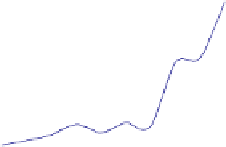Information Technology Reference
In-Depth Information
early 1980s, since the DEC was founded to the time that DEC was sold to Compaq.
The data in table 1 is from the National Bureau of Economic Research (NBER). The
NBER is considered the official arbiter of recessions, but
“the NBER does not define a recession in terms of two consecutive quarters
of decline in real GDP. Rather, a recession is a significant decline in eco-
nomic activity spread across the economy, lasting more than a few months,
normally visible in real GDP, real income, employment, industrial produc-
tion, and wholesale-retail sales”
2
.
Table 1.
Recessions of DEC period generated from NBER data
3
Date
Duration
Time since last
recession
Peak
unemployment
Aug. 1957-April 1958
8
39 months
7.5%
April 1960-Feb. 1961
10
24 months
7.1%
Dec. 1969-Nov. 1970
11
106 months
6.1%
Nov. 1973-March 1975
16
36 months
9.0%
Jan. 1980-July 1980
6
58 months
7.8%
July 1981-Nov. 1982
16
12 months
10.8%
July 1990-March 1991
8
94 months
7.8%
Source: NBER
DEC Employees 1966 to 1976
DEC net profit 1966 to 1976
30,000
80,000,000
70,000,000
25,000
60,000,000
20,000
50,000,000
$
40,000,000
15,000
30,000,000
10,000
20,000,000
5,000
10,000,000
0
0
1966 1967 1968 1969 1970 1971 1972 1973 1974 1975 1976
year
1966
1967
1968
1969
1970
1971
1972
1973
1974
1975
1976
year
Fig. 1.
DEC employees 1966-1976
Fig. 2.
DEC net profit 1966-1976
There are a number of different recession shapes that occur in literature the most
common being V-shaped, U-shaped and W-shaped. DEC suffered, like most other com-
panies, in these recessions but shielded its workers from redundancy by redeployment
2
National Bureau of Economic Research, http://www.nber.org/
3
National Bureau of Economic Research, http://www.nber.org/cycles/cyclesmain.html































































Search WWH ::

Custom Search